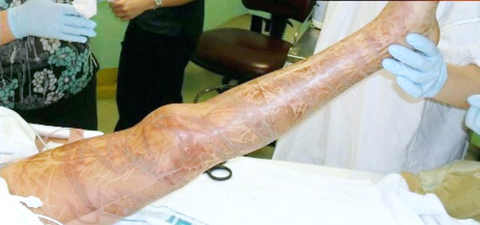A 10-year-old girl has baffled experts by surviving a run-in with a highly venomous box jellyfish, the sting of which can kill an adult within minutes.
Rachael Shardlow was swimming in a river 23km upstream from the ocean in northeast Australia’s Queensland state in December when she was stung. The jellyfish’s tentacles were strapped to her limbs when her brother pulled her out of the water. She told him she couldn’t see or breathe before losing consciousness.
Surviving such a severe sting is unheard of, James Cook University zoology and tropical ecology professor Jamie Seymour said on Tuesday.

PHOTO: AFP
“I don’t know of anybody in the entire literature where we’ve studied this where someone has had such an extensive sting that has survived,” he told Australian Broadcasting Corp radio. “When I first saw the pictures of the injuries I just went, ‘you know to be honest, this kid should not be alive.’ I mean, they are horrific.”
“Usually when you see people who have been stung by box jellyfish with that number of the tentacle contacts on their body, it’s usually in a morgue,” he said.
Box jellyfish have tentacles that can reach 3m long. The sting is so excruciating that many victims go into shock and drown. Those who make it out of the water often die from the venom, which quickly attacks the heart and nervous system. Many Queensland beaches have netted enclosures to keep the creatures away from swimmers.
Shardlow has scarring and some memory loss from the attack, which happened near Gladstone, her father said.
“We’ve noticed a small amount of short-term memory loss, like riding a pushbike [bicycle] to school and forgetting she’s taken a pushbike,” Geoff Shardlow told ABC. “The greatest fear was actual brain damage, [but] her cognitive skills and memory tests were all fine.”

The team behind the long-awaited Vera Rubin Observatory in Chile yesterday published their first images, revealing breathtaking views of star-forming regions as well as distant galaxies. More than two decades in the making, the giant US-funded telescope sits perched at the summit of Cerro Pachon in central Chile, where dark skies and dry air provide ideal conditions for observing the cosmos. One of the debut images is a composite of 678 exposures taken over just seven hours, capturing the Trifid Nebula and the Lagoon Nebula — both several thousand light-years from Earth — glowing in vivid pinks against orange-red backdrops. The new image

Canada and the EU on Monday signed a defense and security pact as the transatlantic partners seek to better confront Russia, with worries over Washington’s reliability under US President Donald Trump. The deal was announced after a summit in Brussels between Canadian Prime Minister Mark Carney and European Commission President Ursula von der Leyen and European Council President Antonio Costa. “While NATO remains the cornerstone of our collective defense, this partnership will allow us to strengthen our preparedness ... to invest more and to invest smarter,” Costa told a news conference. “It opens new opportunities for companies on both sides of the

ESPIONAGE: The British government’s decision on the proposed embassy hinges on the security of underground data cables, a former diplomat has said A US intervention over China’s proposed new embassy in London has thrown a potential resolution “up in the air,” campaigners have said, amid concerns over the site’s proximity to a sensitive hub of critical communication cables. The furor over a new “super-embassy” on the edge of London’s financial district was reignited last week when the White House said it was “deeply concerned” over potential Chinese access to “the sensitive communications of one of our closest allies.” The Dutch parliament has also raised concerns about Beijing’s ideal location of Royal Mint Court, on the edge of the City of London, which has so

OVERHAUL: The move would likely mark the end to Voice of America, which was founded in 1942 to counter Nazi propaganda and operated in nearly 50 languages The parent agency of Voice of America (VOA) on Friday said it had issued termination notices to more than 639 more staff, completing an 85 percent decrease in personnel since March and effectively spelling the end of a broadcasting network founded to counter Nazi propaganda. US Agency for Global Media (USAGM) senior advisor Kari Lake said the staff reduction meant 1,400 positions had been eliminated as part of US President Donald Trump’s agenda to cut staffing at the agency to a statutory minimum. “Reduction in Force Termination Notices were sent to 639 employees at USAGM and Voice of America, part of a